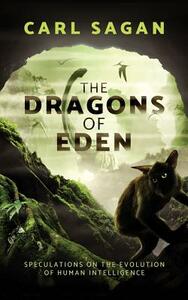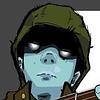Take a photo of a barcode or cover
128 reviews for:
The Dragons of Eden: Speculations on the Evolution of Human Intelligence
Carl Sagan
128 reviews for:
The Dragons of Eden: Speculations on the Evolution of Human Intelligence
Carl Sagan
Sin ser Sagan biólogo evolutivo ni neuroanatomista, le sale un relato muy interesante sobre la evolución del cerebro hasta llegar al neocórtex avanzado de los sapiens. Por el camino nos cuenta mil cosas interesantes y nos enseña a ver cómo todas las partes que vamos conociendo sobre él van encajando en una única historia coherente. Hacia el final del libro cuenta como ciertas algunas cosas que eran solo hipótesis (relación entre el sistema límbico y la capacidad onírica, por ejemplo, y cómo uno lleva a la otra), y otras cosas en l as que aventura cuando parece que enuncia.
Sigue siendo un pilar de la divulgación científica y un libro imprescindible.
Sigue siendo un pilar de la divulgación científica y un libro imprescindible.
informative
lighthearted
reflective
relaxing
medium-paced
Carl Sagan is a boss! This book is 40 years old and some of his predictions on the future discoveries of the human brain and technology were spot on. This is my first Carl Sagan book and I loved it. He has an ability to take very complicated scientific concepts and ideas and explain them in a non-scientific manner. In particular the past of the book when he takes the cosmic calendar and fits it into a human year to show when certain events occurred or when human milestones were reached is AMAZING!
This is a must read.
This is a must read.
challenging
informative
medium-paced
The most hauting question that this book poses is this :
Chimpanzees can abstract. Like other mammals, they are capable of strong emotions.Why, exactly, all over the civilized world, in virtually every major city, are apes in prison?
For a species that has proclaimed itself to be the rulers of Earth, this is not a very difficult question to answer for us. It is a single word : suppression. We humans never much liked competition from other creatures and history tells us that this was how we overcame all our natural predators through weaponry or guile in the eons past. A moment of reflection on our past brings up that question : why did the other humanoids not survive while our ancestors did ? How did they all gt wiped out ? Natural selection could not have been the only answer.This book is one that shook me out of cerebral complacency and like a good author, Sagan opens the cobweb laden windows of my brain and lets the light in.
This is a book length introspection into the nature of human intellect. From the first tottering steps of our primate ancestors to today's technologically addicted life forms, how has the journey been for that mass of tissue between our ears ? This is what Sagan attempts to answer. In simple,lucid and easy to comprehend prose the author breaks down the story of how our brains assumed today's form and reflexes. It is a tour de force that mixes and matches history,paleontology, psychology and other branches of human understanding to come up with a fascinating study.
The evolution of the brain and how the most primal fears in our psyche still rule our subconscious is a fascinating observation and forms the best part of this book. The aspect of the Triune brain and the R-complex's involvement in human behavior is what Sagan calls the Dragons chained away in the dungeons of our minds. Our basic aversion to reptiles and the dreams populated with snakes coupled with the dreams of a fall from a height are all speculated upon by Sagan in teh backdrop of our dreams. They were quire revelatory and while I might at a later point in time (with more reading)debate these points, they did rekindle my interest in the human brain's inner workings.
I finished reading, put down the book and ran my fingers through my hair and muttered You are a rockstar to my brain. The kind of rockstar who you can never fully figure out is how it might react to that comment !
This book is highly recommended and it is no fluke that I rate all of Sagan's books so far as five stars. This is stuff that will genuinely interest the skeptical mind.
Chimpanzees can abstract. Like other mammals, they are capable of strong emotions.Why, exactly, all over the civilized world, in virtually every major city, are apes in prison?
For a species that has proclaimed itself to be the rulers of Earth, this is not a very difficult question to answer for us. It is a single word : suppression. We humans never much liked competition from other creatures and history tells us that this was how we overcame all our natural predators through weaponry or guile in the eons past. A moment of reflection on our past brings up that question : why did the other humanoids not survive while our ancestors did ? How did they all gt wiped out ? Natural selection could not have been the only answer.This book is one that shook me out of cerebral complacency and like a good author, Sagan opens the cobweb laden windows of my brain and lets the light in.
This is a book length introspection into the nature of human intellect. From the first tottering steps of our primate ancestors to today's technologically addicted life forms, how has the journey been for that mass of tissue between our ears ? This is what Sagan attempts to answer. In simple,lucid and easy to comprehend prose the author breaks down the story of how our brains assumed today's form and reflexes. It is a tour de force that mixes and matches history,paleontology, psychology and other branches of human understanding to come up with a fascinating study.
The evolution of the brain and how the most primal fears in our psyche still rule our subconscious is a fascinating observation and forms the best part of this book. The aspect of the Triune brain and the R-complex's involvement in human behavior is what Sagan calls the Dragons chained away in the dungeons of our minds. Our basic aversion to reptiles and the dreams populated with snakes coupled with the dreams of a fall from a height are all speculated upon by Sagan in teh backdrop of our dreams. They were quire revelatory and while I might at a later point in time (with more reading)debate these points, they did rekindle my interest in the human brain's inner workings.
I finished reading, put down the book and ran my fingers through my hair and muttered You are a rockstar to my brain. The kind of rockstar who you can never fully figure out is how it might react to that comment !
This book is highly recommended and it is no fluke that I rate all of Sagan's books so far as five stars. This is stuff that will genuinely interest the skeptical mind.
Of course any 1977 book on neurology and human evolutionary biology is going to be dated -- but this was still a interesting read. These are indeed Sagan's speculations, just as the title promises. I certainly got the sense that Sagan would've been a fascinating person to just hang around and chat with.
I'd be interested to have someone as engaging on the these topics -- but also current, and knowledgeable -- bring this up to date.
I'd be interested to have someone as engaging on the these topics -- but also current, and knowledgeable -- bring this up to date.
informative
inspiring
reflective
medium-paced
This is a very good book, especially for its time. Sagan writes in a pleasant and easy to understand manner which is very accessible to lay people.
This book is about human intelligence: what it is, how it came about and how it relates to other animals, computers and extraterrestrial life. It is a rather complete book, discussing not only scientific experiments and hypotheses, but certain philosophical, sociological and environmental questions still relevant today. In fact, the scientific discussions are the most outdated things about this book. Many things he mentions about neuroscience have changed quite a lot, especially in relation to the functions of different parts of the brain. A lot of things he says about artificial intelligence and computers have changed even more drastically.
Unfortunately, I know very little about neuroscience, natural history, the evolution of humans, linguistics and other animals' intelligence and can't be sure about how outdated his information on these topics is. If anyone has any suggestions of recent books that also discuss these topics, I'd love to hear them!
I 'read' this book in audiobook format. The narration was good and very clear, but I still found it relatively hard to concentrate at moments. That is my own fault, however, as my mind tends to wander when I'm 'reading'. Audiobooks just aren't my ideal format, especially for non-fiction.
Would definitely recommend this book for anyone wanting an introduction to the topic of human intelligence, but anyone reading this book should be aware that it is outdated.
This book is about human intelligence: what it is, how it came about and how it relates to other animals, computers and extraterrestrial life. It is a rather complete book, discussing not only scientific experiments and hypotheses, but certain philosophical, sociological and environmental questions still relevant today. In fact, the scientific discussions are the most outdated things about this book. Many things he mentions about neuroscience have changed quite a lot, especially in relation to the functions of different parts of the brain. A lot of things he says about artificial intelligence and computers have changed even more drastically.
Unfortunately, I know very little about neuroscience, natural history, the evolution of humans, linguistics and other animals' intelligence and can't be sure about how outdated his information on these topics is. If anyone has any suggestions of recent books that also discuss these topics, I'd love to hear them!
I 'read' this book in audiobook format. The narration was good and very clear, but I still found it relatively hard to concentrate at moments. That is my own fault, however, as my mind tends to wander when I'm 'reading'. Audiobooks just aren't my ideal format, especially for non-fiction.
Would definitely recommend this book for anyone wanting an introduction to the topic of human intelligence, but anyone reading this book should be aware that it is outdated.
Interesting. Possibly outdated in places, but still intellectually stimulating.
Hmmmmm, I guess you can say I read this, if you count the fact that is runs from page 208, than skips to the Index at page 241. I don't think the previous owner liked those pages, but on close expection the missing pages don't look like they were ripped out, it is seamless between those two places ... it is doubly shame because it's a first edition hardcover print. :(
Outside that the book is great and I'd really love to read a modern equivalent. If anyone knows of one please direct me.
Outside that the book is great and I'd really love to read a modern equivalent. If anyone knows of one please direct me.





